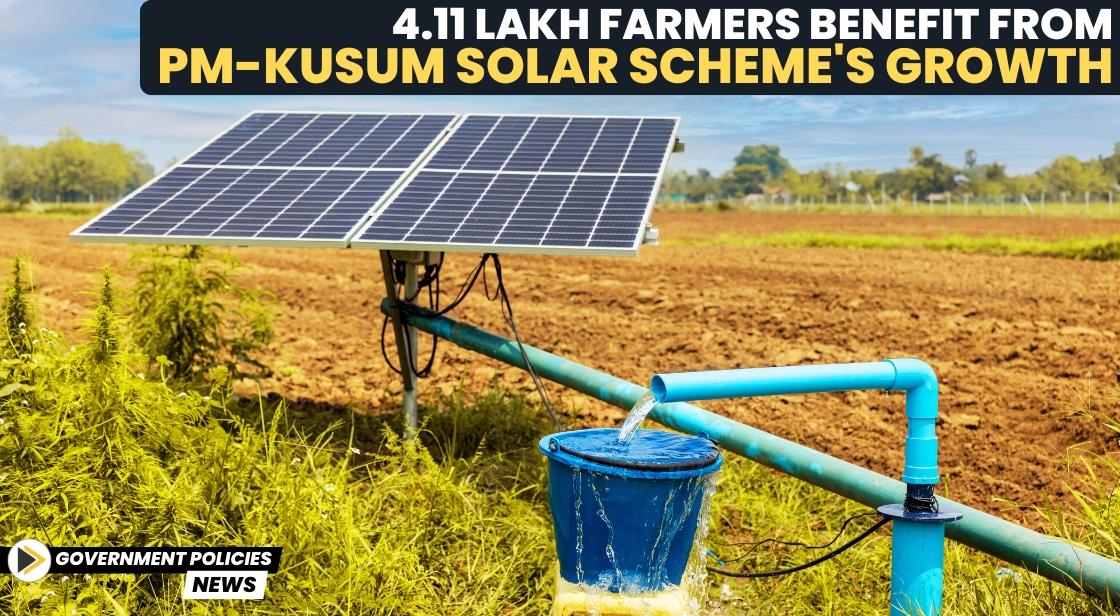4.11 Lakh Farmers Benefit from PM-KUSUM Solar Scheme's Growth

News Synopsis
As of June 30 this year, the PM-KUSUM (Pradhan Mantri Krishi Urja Suraksha Evam Utthaan Mahabhiyan) scheme has made a substantial impact on India's agricultural sector. Launched in March 2019 and significantly expanded in January 2024, this initiative aims to transform farming practices by installing solar power plants and irrigation pumps on farmers' lands. By providing reliable energy and water resources, PM-KUSUM helps ensure energy security and enhance water availability for irrigation.
This, in turn, boosts farmers' incomes by reducing their dependency on costly diesel-powered irrigation and mitigating environmental pollution. The scheme has reached over 4.11 lakh farmers nationwide, demonstrating its success in promoting sustainable agricultural practices. Minister of State for New & Renewable Energy, Shripad Yesso Naik, highlighted these achievements in a recent Rajya Sabha session, showcasing the government's commitment to advancing renewable energy in agriculture.
Regional Impact: Uttar Pradesh's Contributions
In Uttar Pradesh, one of the largest beneficiaries of the PM-KUSUM scheme, 51,097 farmers have received benefits as of July 29 this year. This data underscores the scheme’s substantial impact on individual states, contributing to the broader success of the national initiative.
Scheme Components and Benefits
The PM-KUSUM scheme comprises three main components, each designed to address different aspects of agricultural energy needs:
Component-A: Decentralized Solar Power Plants
Under Component-A, farmers are empowered to establish decentralized ground-mounted solar or other renewable energy-based power plants on their lands, with a capacity of up to 2MW. The renewable energy generated is purchased by DISCOMs (Distribution Companies) at a pre-fixed tariff. If farmers choose to lease their land to developers, they are also eligible to receive lease rent. Additionally, DISCOMs can earn a Performance Based Incentive (PBI) of ₹0.40 per unit purchased or ₹6.6 lakh per MW of capacity installed, whichever is lower, for five years from the Commercial Operation Date. This incentive may be passed on to the Renewable Energy Power Plant (REPP) owner, potentially leading to more competitive tariffs.
Component-B: Solar Agriculture Pumps
Component-B focuses on providing stand-alone solar agriculture pumps for irrigation. The government supports this initiative with a central financial assistance of 30% of the cost (or 50% for North Eastern Regions, Hilly Regions, and Islands). This component aims to enhance irrigation capabilities by providing reliable solar-powered water pumps.
Component-C: Solarisation of Grid-Connected Agriculture Pumps
Component-C encompasses two subcomponents: Individual Pump Solarisation (IPS) and Feeder Level Solarisation (FLS) of agricultural loads. The scheme provides central financial assistance of 30% (or 50% for North Eastern Regions, Hilly Regions, and Islands) for both IPS and FLS. This initiative ensures that farmers have access to daytime assured solar energy, contributing to consistent and reliable irrigation.
Conclusion
The PM-KUSUM (Pradhan Mantri Kisan Urja Suraksha evam Utthaan Mahabhiyan) scheme is a groundbreaking initiative aimed at revolutionizing India's agricultural sector through enhanced sustainability and energy efficiency. By integrating solar power technology into agricultural practices, this scheme offers a multifaceted approach to addressing critical challenges faced by farmers. It provides financial support by subsidizing solar pump installations, thus reducing the dependency on expensive diesel-powered pumps and lowering operational costs for farmers. Additionally, it contributes to environmental conservation by cutting down greenhouse gas emissions associated with traditional energy sources. The scheme's structured framework includes components for solarizing irrigation, installing grid-connected solar power projects, and setting up decentralized solar power systems. This comprehensive strategy not only addresses immediate energy needs but also promotes long-term energy security and financial stability for farmers. Through these efforts, PM-KUSUM underscores the government’s dedication to fostering a sustainable agricultural ecosystem and advancing rural development.
You May Like









